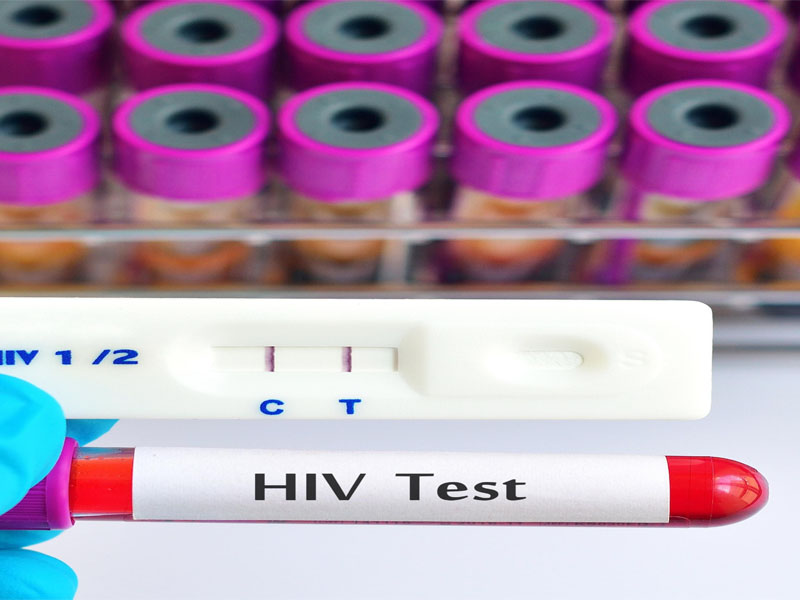
Among the many screenings recommended during prenatal care, HIV testing during pregnancy stands out as one of the most critical for your health and your baby’s safety.
Human Immunodeficiency Virus (HIV), if undetected and untreated, can compromise your immune system and pose serious risks during pregnancy, including the possibility of transmitting the virus to your baby.
Yet, despite medical advancements, HIV diagnostic testing is still surrounded by stigma, fear, and misinformation. Some high-risk pregnant women may even avoid testing due to anxiety, shame, or fear of judgment. But HIV testing is about protection, empowerment, and giving both you and your baby the best possible start.
Here, we’ll walk you through everything you need to know about HIV screening and testing during pregnancy: How does HIV affect my body? How often should I get tested? What does the testing process involve? What happens after birth if I’m HIV positive?
Whether you’re newly expecting or planning to conceive, understanding pregnancy HIV testing can help protect both your health and your baby’s future.
Table of contents
What is HIV?
Why HIV Testing Matters During Pregnancy
HIV Testing for Pregnant Women: CDC Recommendations
HIV Testing Dallas: What Does Texas Law Say?
HIV Testing: Types, Timing, and Accuracy
How Are Babies Tested?
Postpartum HIV Management: Ongoing Care for Mothers
What is HIV?
HIV, or Human Immunodeficiency Virus, is a virus that attacks your body’s immune system, specifically targeting your T cells that help the immune system fight off infections.
If left untreated, the Human Immunodeficiency Virus gradually weakens your immune system. This makes it harder for your body to defend itself against common infections and certain cancers.
Over time, this sexually transmitted infection can lead to AIDS (acquired immunodeficiency syndrome), the most advanced stage of HIV infection. This is when your immune system is severely compromised.
HIV is a sexually transmitted infection acquired through contact with certain body fluids, such as:
- Blood
- Semen
- Vaginal fluids
- Rectal fluids
- Breast milk
During pregnancy and childbirth, possible transmission of HIV from mother to baby makes early detection and management vital for healthy outcomes.
The good news is that HIV infection is no longer a life-limiting condition. Thanks to medical advancements, it’s become a chronic, treatable illness. With consistent use of antiretroviral therapy (ART), people living with HIV can maintain a healthy immune system and live long, full lives.
For pregnant women, early diagnosis and treatment not only safeguards their health but also significantly reduces the risk of transmitting the virus to their babies. That’s why routine HIV testing during pregnancy is crucial.
 Why HIV Testing Matters During Pregnancy
Why HIV Testing Matters During Pregnancy
HIV testing is a vital part of prenatal care because it directly affects both your health and your baby’s safety.
Without testing, an HIV-positive mother may unknowingly carry the virus through pregnancy. This increases the risk of mother-to-child transmission – also known as perinatal HIV transmission.
HIV infection can transmit from mother to baby in three ways:
- During pregnancy (through the placenta)
- During childbirth (exposure to blood and fluids)
- Through breastfeeding
Identifying acute HIV infection during pregnancy is especially important, as the risk of perinatal transmission is higher when the mother is newly infected and viral levels are at their peak.
Without treatment, the risk of perinatal HIV transmission can be as high as 15% to 45%. However, with early antiretroviral therapy, this risk of perinatal transmission can drop dramatically to less than 1% in most cases.
So, early HIV testing matters in order to start treatment if necessary.
Early intervention helps you maintain your own health and immune function, setting the foundation for a strong postpartum recovery and long-term well-being.
Due to the importance of early detection, we recommend routine HIV testing during pregnancy for all pregnant women, high risk or not (more on the CDC guidelines below).
This approach helps reduce stigma, normalizes testing as part of standard care, and ensures that no case goes undetected simply because symptoms are absent, or high-risk factors are misunderstood.
 HIV Testing for Pregnant Women: CDC Recommendations
HIV Testing for Pregnant Women: CDC Recommendations
The Centers for Disease Control and Prevention (CDC) recommends screening for all pregnant women as a routine part of prenatal care, regardless of whether they’re at high risk. Key points from the CDC guidelines include:
Initial HIV Test: They recommend HIV screening for all pregnant women as early as possible in the first trimester.
Third Trimester Repeat HIV Testing: They recommend a second HIV test during the third trimester (preferably before 36 weeks) for pregnant women who:
- Are at high risk for HIV
- Live in areas with high rates of HIV
- Were not tested earlier in the pregnancy
Rapid Testing at Delivery: If a woman has not been tested for HIV before labor, a rapid HIV test should be offered during labor and delivery to allow for immediate intervention if needed.
Expedited HIV Testing: In situations where a woman’s HIV status is unknown at the time of labor, expedited HIV testing is best practice to ensure immediate results and guide decisions about antiretroviral medication for both mother and baby.
Alongside HIV, the CDC also recommends screening for other infections such as syphilis and the hepatitis C virus, particularly in individuals with known risk factors.
Why is HIV Tested Twice During Pregnancy?
Repeat HIV testing is not a sign of mistrust, but a universal HIV screening standard rooted in evidence.
As we mentioned, your doctor will often test twice for HIV during pregnancy – once in the first trimester, and again in the third trimester. This ensures early detection and ongoing protection for both you and your baby.
Here’s why the repeat HIV testing approach is advisable:
1. Early Detection for Early Treatment
The first HIV test typically occurs during your initial prenatal visit (usually in the first trimester). If you’re living with HIV and unaware of it, early testing allows for:
- Immediate start of antiretroviral therapy (ART).
- Close monitoring of viral load throughout the pregnancy.
- Planning for a delivery method that reduces transmission risk.
- Making appropriate feeding choices to minimize postnatal transmission of HIV.
- Support and counseling services.
2. Detecting New Infections Later in Pregnancy
Even if the first HIV test is negative, a second test in the third trimester (between 28–36 weeks) helps detect any new infection that may have occurred after the initial screening. This is important because:
- A new HIV infection during pregnancy can carry a higher viral load, increasing the risk of HIV transmission.
- Your immune system hasn’t yet developed antibodies, so catching the virus early with more sensitive tests can be lifesaving.
- There’s still time to begin treatment and take preventive steps before delivery.
HIV Testing Dallas: What Does Texas Law Say?
In the state of Texas, HIV testing during pregnancy is addressed through specific public health laws designed to align with CDC recommendations while protecting the rights of pregnant women.
Key legal requirements include:
- Mandatory Offering of Testing: Healthcare providers are required by law to have HIV tests available to all pregnant women during both the first and third trimesters.
- Verbal or Written Consent: Texas operates under an opt-out approach, meaning HIV testing is performed as part of routine prenatal labs unless the patient refuses. Verbal consent is generally sufficient, but documentation in the medical record is required.
- Refusal of Testing: Pregnant women have the legal right to refuse HIV testing at any point. Providers must respect this decision and cannot test without consent.
- Testing at Labor and Delivery: If a pregnant person has undocumented HIV status at the time of delivery, Texas law requires that they be offered a rapid HIV test unless they refuse.
Now, let’s understand the procedure and the different kinds of HIV testing.
 HIV Testing: Types, Timing, and Accuracy
HIV Testing: Types, Timing, and Accuracy
As you know by now, HIV testing during pregnancy is one of the most important steps you can take to protect both your health and your baby’s.
But, with different test types and medical terms, it can feel confusing. So, here’s a summary of available HIV tests.
What Are the Main Types of HIV Tests?
There are three main types of HIV tests. Each looks for something different, and they work at different stages after infection:
Antibody Test
This looks for antibodies that are fighting HIV. It’s quick and easy, often done with a finger prick or mouth swab, and you can get a rapid HIV test result in only 20 minutes.
Antigen/Antibody Test (4th Generation Test)
This is most common for HIV testing during pregnancy. It looks for both HIV antibodies and a protein called p24 antigen, which shows up early after infection.
For this reason, it can often detect acute HIV infection earlier than older tests because the p24 antigen appears before HIV antibodies form. This test is usually done with a blood draw at a lab.
HIV Nucleic Acid Tests (NAT or RNA Tests)
This test looks directly for the virus itself. It’s super sensitive and can find HIV very early. NAT testing is not usually used for routine testing in pregnant women, but mostly for special cases or if symptoms appear early.
When Do These Tests Work Best?
HIV doesn’t show up in your blood right away after infection. That’s why timing matters when it comes to testing. Here’s a helpful summary:
Please note that during acute HIV infection, which occurs in the first few weeks after exposure, some tests may not yet detect the virus, making it important to choose the right test at the right time.
Are These Tests Accurate?
Yes. All FDA-approved HIV tests are very accurate when taken at the right time. Antibody and antigen/antibody tests are over 99% accurate after their detection window. But if you get a positive HIV test result, your provider will always confirm it with another test to make sure.
What Does HIV Testing During Pregnancy Look Like?
Most prenatal care providers use the antigen/antibody blood test because it’s safe, fast, and reliable.
If you get a positive result, your doctors will immediately start the treatment to prevent perinatal transmission. If your HIV status is unknown at delivery, they may use a rapid test to check before the baby is born.
And After Birth? What Are the Postpartum Considerations?
When it comes to HIV, care doesn’t stop after your baby is born.
The period around birth and the weeks that follow are crucial for both detecting HIV in newborns and providing ongoing care for HIV-positive mothers.
For this reason, if you receive a positive HIV diagnosis during pregnancy or at delivery, doctors will test your baby after birth.
 How Are Babies Tested?
How Are Babies Tested?
To accurately detect HIV in newborns, doctors use a plasma HIV RNA assay. This looks directly for the virus in your baby’s blood rather than relying on antibodies passed from you.
These tests are done at specific intervals, as follows:
- At birth
- 2 to 3 weeks
- 4 to 6 weeks
- 4 to 6 months
A baby is considered HIV negative after two negative results from tests done after 1 month of age and another after 4 months. If your baby gets a positive result, you’ll need help from a pediatric HIV specialist as soon as possible.
Is HIV Medicine Given to Babies Right Away?
Yes. If there’s any risk of HIV exposure, babies are given antiretroviral medication (usually Zidovudine) starting within 6 to 12 hours of birth. This treatment continues for 4 to 6 weeks to help prevent infection from taking hold.
 Postpartum HIV Management: Ongoing Care for Mothers
Postpartum HIV Management: Ongoing Care for Mothers
For mothers living with HIV, postpartum care is just as important as prenatal care in pregnant women. It helps reduce perinatal HIV transmission in the future. Postpartum HIV care involves the following:
Continuing antiretroviral therapy (ART): Staying on daily medication keeps the virus suppressed and helps your immune system stay strong.
Monitoring health: Regular doctor visits will check viral load, CD4 count, and your overall wellness.
Mental health support: HIV can carry emotional stress, and postpartum changes can intensify this. Counseling and support groups can make a big difference.
Feeding considerations: In the US, the recommendation is that HIV-positive mothers do not breastfeed, as HIV infection can be transmitted through breast milk. Formula feeding is better – and supported.
Family planning: Discussing future pregnancies and contraceptive options with a healthcare provider is part of your long-term care plan.
Ongoing care may also include regular screenings for other infections like the hepatitis C virus – since co-infections can affect treatment choices and overall health outcomes.
 Stella Mattina Prioritizes HIV Testing During Pregnancy
Stella Mattina Prioritizes HIV Testing During Pregnancy
HIV testing during pregnancy is a vital part of a healthy pregnancy. At Stella Mattina, our ObGyns specialize in perinatal care and HIV screening during pregnancy. They’re passionate about ensuring you and your baby receive the care and support you deserve. They can also call on our Maternal Fetal Medicine specialists when necessary.
So – if you’re searching for HIV testing near me, we have at least 10 locations to choose from. We’re welcoming and non-judgmental – y también hablamos español.
So stay safe by scheduling your prenatal screening today.
Dr. Krum is currently in practice in Arlington, TX. He received his undergraduate degree at Texas A&M University, then attended UTMB Galveston for medical school, finishing in 1986, completing his residency there in 1990. Providing a full range of obstetrical and gynecological care, he specializes in the treatment of endometriosis and robotic surgery. He arranges his schedule so that same-day appointments are usually available.
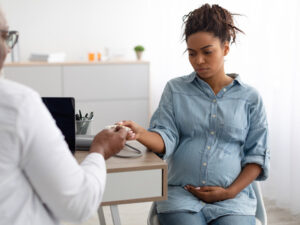
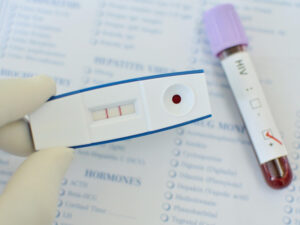 Why HIV Testing Matters During Pregnancy
Why HIV Testing Matters During Pregnancy HIV Testing for Pregnant Women: CDC Recommendations
HIV Testing for Pregnant Women: CDC Recommendations HIV Testing: Types, Timing, and Accuracy
HIV Testing: Types, Timing, and Accuracy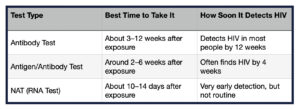
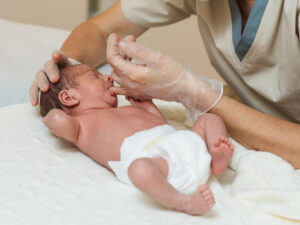 How Are Babies Tested?
How Are Babies Tested?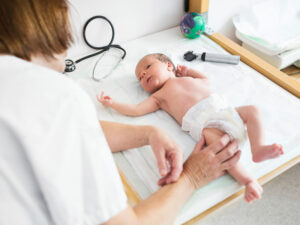 Postpartum HIV Management: Ongoing Care for Mothers
Postpartum HIV Management: Ongoing Care for Mothers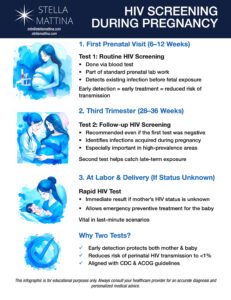 Stella Mattina Prioritizes HIV Testing During Pregnancy
Stella Mattina Prioritizes HIV Testing During Pregnancy